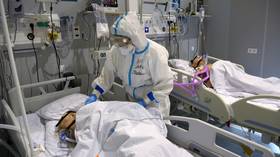Russian official reveals how long Covid-19 patients could be contagious

Covid-19 patients could stay contagious for more than three months after infection, one of Russia's top health officials warned on Thursday, as the country battles sharp increases in the numbers of cases and deaths from the virus.
“[The virus] has been observed to last 80, or even over 100 days,” said Anna Popova, the head of the Rospotrebnadzor health watchdog, in a radio interview with Moscow tabloid KP.
“The latest research shows this. And of course, no doctor will take a patient off the sick list who is going to continue to be a danger and spread the virus,” she went on to say.
Popova clarified that the incubation period for Covid-19 is fourteen days, meaning that symptoms will appear no later than two weeks after infection. It’s very important, she said, for people who have come into contact with Covid to be observed during that time, to be sure whether they have the virus or not.
“If someone is already sick, then their doctor will determine how long they need to stay home,” she explained. “This isn’t only so that they won’t infect others … they should get clear of the virus and recover completely.”
She also noted that there were many Russians who had contracted Covid-19 and not gone to a doctor. “The number of people with antibodies isn’t itself very large, but of those, most of them are people who avoided medical help,” she said.
Earlier in the pandemic, Russians who tested positive for the virus were placed under strict quarantine rules and monitored using mobile phone apps.
Russia has recorded record daily numbers of Covid-19 cases and deaths across the last few weeks, with less than half of the population vaccinated despite the wide availability of jabs. Authorities recommend that people who suspect they may be infected stay home and talk to a doctor, who will decide if testing or quarantine is necessary.
This week, the Kremlin ruled out the possibility of monetary fines for those who refuse immunization. However, the country’s national parliament is considering implementing a nationwide QR-code system which would restrict access to public places and transportation based on whether people have gotten the jab or not.














